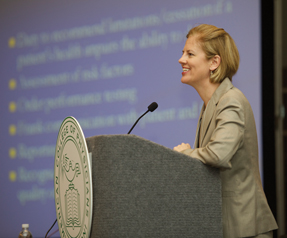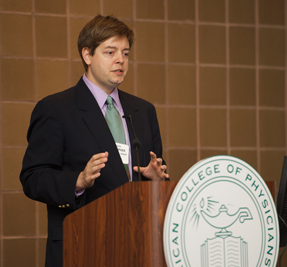Diving into delicate patient conversations
Delivering unpleasant news is one of the hardest tasks a physician faces. Assessing sensitive topics heightens the difficulty, and two physicians at Internal Medicine 2012 address ways to handle especially sensitive areas: sexual history, and the inability to safely drive a car.
Conversing with patients should be one of the most enjoyable parts of general internal medicine practice. But there are two topics that can make taking a history more uncomfortable than a digital rectal exam: sex, and an elderly person's ability to drive.
As a geriatrician and associate professor of medicine at the University of Pittsburgh, Hollis D. Day, MD, FACP, has experience with the awkwardness of talking to elderly patients about their driving ability. “This is probably one of the most challenging topics that I personally face in my practice,” she said. “If they had rotten tomatoes, I would have been given those.”
Patients may not throw tomatoes when you ask about their sex lives, but they may not want to answer, either, according to Carrie Horwitch, MD, FACP, a clinical assistant professor at University of Washington and HIV specialist at Virginia Mason Medical Center in Seattle. Many physicians are also not adequately trained in how to broach such a delicate subject. “What I was taught in medical school and residency training did not prepare me to do this well,” said Dr. Horwitch.
To help internists develop greater comfort and expertise in conducting these conversations, Drs. Day and Horwitch led sessions at Internal Medicine 2012, held in New Orleans in April, on assessing driving safety and taking a sexual history, respectively. “We need to make sure it's just like other disease things we talk about. These diseases can kill people, can maim people,” said Dr. Horwitch.
Let's talk about sex
In most practices, sexual history taking will be the more common conversation. Even geriatric patients should be questioned about their sexual history. “My oldest HIV patient is 88 years old,” Dr. Horwitch noted. The target population for sexual history taking is “anyone who has never had sex, anyone who is currently having sex, and anyone who has ever had sex” or, in other words, everyone, she said.
Many clinicians were taught to take a sexual history by asking, “Are you sexually active?”
“That question is unhelpful,” said Dr. Horwitch. “That means a lot of different things to different people.” Even working in a sexually transmitted disease (STD) clinic, she had patients occasionally answer “no” to that question.

More specific questions will get more useful answers. An effective sexual history should cover five “P”s: partners, practices, prevention of pregnancy, prevention of STDs and past history of STDs, Dr. Horwitch advised. A physician can start the questioning by asking about partners: “Do you currently have a sexual partner? Have you had sex in the past two months, six months, year, ever? How many partners have you had in the past two months, six months, etc.?”
Although the traditional strategy has been to ask these questions while taking the social history, that's not a necessity, according to Dr. Horwitch. “Whenever it seems to be more comfortable for you to take it is a perfectly acceptable time,” she said. A point in the visit when the patient is clothed and alone with you in the room will likely be most comfortable.
Questioning about partners should also address the issue of sexual orientation, perhaps with a question like “Have your partners been male, female or both?” Dr. Horwitch never uses terms such as gay, lesbian or homosexual, and she said that specific, simple words also work best for discussing the type of sex that patients engage in. “I will ask if they have vaginal, rectal or oral sex,” she said. “If they don't understand, you may need to use simpler language.”
Monogamy is another word that can be interpreted differently by different patients and so is best avoided. Dr. Horwitch has talked to patients who said that yes, they were monogamous but “a week at a time, meaning they had four partners in a month.”
Questions about sexual practices should also address whether the patient has ever had sex in exchange for money or drugs (note the avoidance of the word “prostitution”) and also whether he or she has any difficulties or concerns regarding sex. “This is a good question for the elderly, who may have sexual dysfunction issues,” Dr. Horwitch said.
The pregnancy and STD portions of the history are fairly self-explanatory, but physicians should keep in mind that this is a good point to provide any necessary education, possibly including some motivational interviewing to encourage safe sexual practices.
It's not necessary, of course, to go through all of these questions at every visit. “I try to get a comprehensive sexual history at one visit. It may not even be the very first visit,” said Dr. Horwitch. “Each year when you see them, you just have to cover the interim time.”
Some visits, however, may offer more indication for a sexual history taking than others. “You need to be mindful that almost any disease presentation could actually be an STD,” she said. During the Internal Medicine workshop, Dr. Horwitch and a colleague performed a role play in which an 83-year-old man was seen for a recent fall but also had a rash that could be syphilis.
The elderly man (as played by Roger W. Bush, MD, FACP) resisted Dr. Horwitch's questions about recent sexual partners, saying “You're getting really personal here. Is this really important?”
Dr. Horwitch demonstrated how to raise the subject and convince patients of the importance of answering honestly. “Many times when I see a rash like this, there are several possible diseases that can go along with this. One of them is called syphilis. Have you heard of that?” she said to the mock patient.
Under her questioning, he eventually explained that he had recently received oral sex. But this won't always happen, acknowledged Dr. Horwitch. “If somebody really doesn't want to answer something, it's OK,” she said. One option is to go back to the subject later, or another is to just get the patient's consent to a test without finishing the sexual history.
In some cases, it will turn out that the patient was just uncomfortable, not withholding information. “You may see pushback,” said Dr. Horwitch. “Sometimes it can mean that they have very little risk; sometimes it can mean that there is something they really don't want to reveal.”
Taking the keys
Likewise, patients may be reluctant to get into a discussion of their driving ability, regardless of whether it's impaired.
However, Dr. Day has some strategies for easing them into the subject. The Annual Wellness Visit that is now covered by Medicare is a good opportunity to talk about driving with older patients, she noted. Or, if you're bringing up the subject during a visit for another problem, you can introduce it by saying something like “I'd like to spend a little time today talking about things that we don't often talk about.”

The things that physicians do typically talk about, such as chronic illnesses, can have significant effects on driving, according to Dr. Day. “Driving is a highly integrative task that depends on psychomotor, cognitive and sensoriperceptual functions,” she said. Conditions and diseases that are particularly likely to affect these functions include stroke, diabetes, cardiovascular disease (both ischemia and arrhythmias), arthritis, dementia, Parkinson's disease and seizure disorders.
Certain prescription drugs may also indicate patients who should be asked about driving, including benzodiazepines, opioids, hypoglycemic agents, antihistamines (especially older ones), and even antidepressants. “We have millions of people on antidepressants,” Dr. Day noted. Taking an antidepressant does not necessarily make someone a driving hazard, of course, but driving could be affected when a patient starts a new drug or a higher dose, she added.
Even without any of these particular conditions or medications, normal aging will affect many people's driving ability, Dr. Day said. Joint or muscle problems could make it more difficult to turn and look in a mirror, or decreased retinal sensitivity could make it more difficult for eyes to adjust to light changes when driving in and out of a tunnel.
“There's a drop in peripheral field vision. This is something that's very important but underemphasized,” Dr. Day said. Loss of olfactory sense could make it harder to notice when an engine has malfunctioned, while a decline in kinesthetic sense could make it more difficult to judge one's own and other's speed.
Speeding, however, is not typically a problem with elderly drivers. Research has shown that elderly drivers have more traffic violations (as well as collisions and traffic fatalities) than their younger counterparts, but they are more often stopped for driving too slowly than for speeding. “That goes up substantially in the 80- to 89-year-old category,” Dr. Day said.
To suss out these problems in elderly patients, ask them routinely about changes in their driving patterns in the past year and any recent accidents or violations. A preliminary screen should also cover driving frequency and distance, although those who only take short trips may still be at risk since most accidents happen close to home, Dr. Day said.
If a patient seems like a potential driving risk, he or she can be asked a list of 10 standard questions (from the AMA Physician's Guide to Assessing and Counseling Older Drivers) either on a questionnaire or by someone in the office. In addition to covering accidents and violations, the questions address more subtle issues, such as “Have you ever forgotten where you were going?” and “Do others honk at you or show signs of irritation?”
A few positive answers are not definitive evidence of a problem, of course. If other drivers honk at you, “You may have always been a bad driver,” noted Dr. Day.
Family members can be helpful in differentiating long-term bad driving from new-onset driving impairment. The patient questionnaire includes one question on this point (“Have others criticized your driving or refused to drive with you?”) but there's also another list of 10 questions from the AMA guide that can be asked of family members. If, for example, the patient is no longer allowed to drive his grandchildren around, that may be a red flag, Dr. Day said.
If it appears that the patient likely has a driving impairment, further assessment could include the “Get-Up-and-Go” test (to determine physical function) or the Trail Making Test (for cognitive function). “You might think of referring someone for neuropsych testing if you're concerned,” she said.
Once you've determined that the patient is not safe for the road, the really awkward part of the already difficult conversation has to occur. Dr. Day offered some advice on approaches that have worked for her. “I used to think this was dorky, but it turns out it works: ‘You've retired from work and other things. There comes a time to retire from driving.’”
Not all patients will respond to that technique, so it might be necessary to push a little harder. Dr. Day sometimes asks patients, “Would you want [an impaired driver] to hit your grandchild? Would you want to hit someone's child?” If that isn't enough to get a patient's agreement to quit, try writing a prescription saying “Do not drive” or get family members involved to remove access to a vehicle.
Physicians should also help patients with the transition away from driving by connecting them with transportation resources (often available from local agencies on aging) and watching for negative psychological effects. “This is a very common cause of new-onset depression,” said Dr. Day. “You have to prepare for the aftermath.”
Reporting results
There can also be some legal aftermath to these difficult conversations, since both driving impairment and STDs can be subject to mandatory reporting. In both cases, the requirements vary by state, so physicians should learn what must be reported to their local authorities.
It's also only fair to warn the patients about mandatory reporting, at least after you've collected the reportable information, both physicians said. Dr. Day said that the requirement to report impaired patients to the Department of Motor Vehicles can actually be helpful in silencing their protests. “I say, ‘My license is on the line. I have to report you.’”
In the case of STDs, Dr. Horwitch reassures patients that although reporting of certain diseases to public health authorities is mandatory, their confidentiality will be maintained. And then she reminds them of a point that is equally true of driving impairment: “This not only affects you, it can affect the entire community.”





